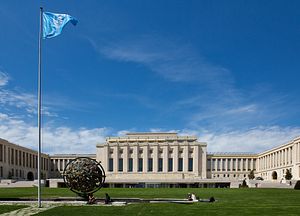Cambodia presented its human rights report before the United Nations Office in Geneva amid growing allegations that abuses are being systematically committed by state forces. The UN committee acknowledged that Cambodia has introduced some reforms in recent years, in particular land reform and registration of indigenous communal lands. But it also expressed dissatisfaction with the answers given by the Cambodian representatives, especially over the issue of impunity and extrajudicial killings.
The Cambodian government was represented by Ney Samol, Permanent Representative of Cambodia to the UN Office at Geneva, and Mak Sambath, president of the National Human Rights Committee of Cambodia.
The committee tackled several issues that seek to probe the role of the Cambodian government in addressing the rising number of human rights violations across the country in the past two decades.
One panel member asked why the police seemed hesitant to aggressively pursue investigations involving trafficking cases. Related to women’s issues, another panel expert expressed concern about the plight of women workers in the garment sector. The panel also cited a report published by Cambodia’s Minister of Women’s Affairs in 2012 and 2013 which mentioned that 35 percent of men had used some form of physical violence against women. It confirmed news reports of increasing incidences of domestic violence, rape, and acid attacks.
Cambodia was praised for abolishing death penalty but an expert observed that “there was still a gap between law and practice with regard to the right to life.” Proof of this is the unsolved murder cases of 12 journalists.
Cambodia was pressed to improve its policies concerning civil and political rights. The committee enumerated several laws and programs that limit free speech and assembly on the grounds of defamation, disinformation and incitement. Journalists were in fact threatened with detention and prosecution for purportedly spreading disinformation. Two other draft laws, cybercrime and civil society regulation, could also undermine citizen rights. An expert urged Cambodia to involve the public in finalizing these measures.
The committee also demanded more information about Cambodia’s prison system. Finally, it encouraged the government to respect the integrity and independence of the judiciary.
Cambodia firmly denied that activists are persecuted in the country. According to the government side, everyone in Cambodia is free to conduct political work as exemplified by the more than 1,000 NGOs that focus on human rights. Overall, there are more than 4,000 NGOs allowed to operate in the country, and these groups are not forbidden to criticize government policies.
The government also informed the committee that prison visits are regularly made to prevent torture. It claimed that it has been “working tirelessly” to solve the cases of disappeared and murdered journalists. It insisted that there’s no impunity in Cambodia.
It reminded the committee that Cambodia has been cooperating with international bodies to monitor the country’s compliance with human rights agreements. So far, Cambodia has already welcomed five special rapporteurs.
At one point of the proceedings, the Cambodian panel was combative. Asked about the gender imbalance in the government delegation, the Cambodian representative retorted that all five special rapporteurs to Cambodia had also been male, just like all secretary-generals of the UN.
The representative went on to defend the country’s record in upholding women’s rights by mentioning that some 20 percent of women were in leading positions in Cambodia’s public institutions.
Finally, the Cambodian government stressed that protests or public gatherings that threaten “security and stability” are temporarily prohibited.
Cambodia’s report to the UN was criticized by Licadho, a local human rights group. It noted that the report “lacks any connection to the present situation on the ground and reflects the authorities’ unwillingness to seriously acknowledge and address serious and systematic human rights violations.”
Meanwhile, Human Rights Watch, an international watchdog, submitted several recommendations to the UN pertaining to the human rights situation in Cambodia. Some of these included the establishment of an independent commission to investigate irregularities in the 2013 elections, the opening of the media sector to independent and opposition voices, and a lifting of all arbitrary bans on freedom of peaceful assembly and association.

































